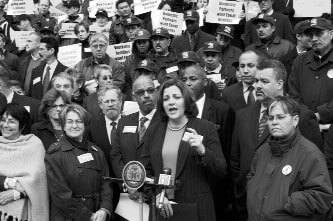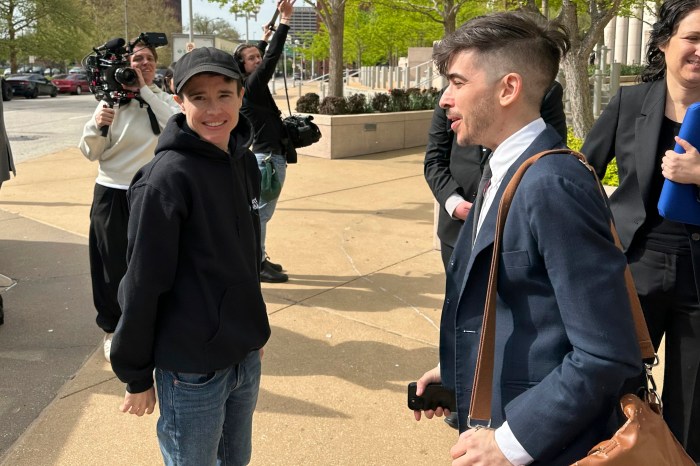Quinn claims veto-proof majority for domestic partner bill Bloomberg opposes
A landmark bill requiring contractors doing business with the city to provide the same benefits to employees’ domestic partners they afford to their spouses had its first hearing in the City Council on November 13. Supporters of the bill predict its passage despite intensified opposition by Mayor Michael Bloomberg.
The hearing on the Equal Benefits Bill (EBB) was conducted before the Contracts Committee, chaired by City Councilmember Robert Jackson, a Manhattan Democrat.
Despite anticipated opposition from right wing religious contractors, none showed up to testify against the bill. Two representatives of the Bloomberg administration did testify, however, and raised dubious legal arguments against the EBB and then declared themselves incapable of explaining their testimony.
Terri Matthews, an assistant to Deputy Mayor Marc V. Shaw, delivered the Bloomberg administration’s testimony with the city’s contracts director, Marla Simpson, at her side. Matthews asserted that the courts have “repeatedly held that the General Municipal Law prohibits social policy restrictions on municipal contracting.” Contracts Committee counsel Rob Newman later told Gay City News that the legal precedents cited had to do with the actions of public authorities, not municipalities.
Councilmember Christine Quinn (D-Manhattan), an out lesbian and the EBB’s lead sponsor, confronted Matthews about the Living Wage Law, a measure that enforces minimum wage requirements on city contractors signed by Bloomberg last year despite his initial opposition. Matthews was unable to reconcile the administration’s compliance with that law with its legal argument opposing the EBB.
Alan Van Capelle, executive director of the Empire State Pride Agenda (ESPA), part of the 80-group coalition working for the bill, said in a post-hearing interview, “The administration disrespected the process by sending staff who raised legal issues and were unprepared to discuss them.” Van Capelle added that if the mayor believes that businesses should provide domestic partner benefits, as his aides insisted, but won’t use the city’s contracting powers to secure them, “it is incumbent on him to come up with alternatives on how to do it.”
Bloomberg has gone from supporting the bill as a mayoral candidate to opposing it on the grounds that he fears the new law would jeopardize the city’s ability to contract for affordable goods and services. In last week’s testimony, administration officials said the requirements imposed by the measure are illegal.
At a press conference the day of the hearing, Quinn vowed to override a mayoral veto. According to Quinn, the bill enjoys the support of 36 co-sponsors as well as the support of Speaker Gifford Miller, another Manhattan Democrat.
Quinn called the EBB “morally correct and good business.” Huge posters listing businesses that provide domestic partner benefits (including Bloomberg, LLP which extended them to employees shortly before the last mayoral campaign) flanked Quinn. She noted that the bill is not solely a gay and lesbian issue, citing the fact that 72 percent of those who have registered as domestic partners in the city are “self-described heterosexuals.”
Legislation similar to the EBB was first passed by San Francisco in 1997. The law there survived several key court challenges and has been credited with bringing about domestic partnership progress at thousands of companies.
Cynthia Goldstein, who oversees the implementation and enforcement of San Francisco’s law, testified that “it doesn’t cost a lot for employers to comply.” She also said that “costs to the city are minimal,” and that “religious organizations can comply,” explaining that the law there specifically allows employers to let their workers designate one other person, regardless of the relationship between the two, as the benefits beneficiary. That provision led the San Francisco Catholic Archdiocese to drop its opposition to the bill.
“The law will reduce city funding spent on providing medical care for the uninsured,” Goldstein predicted.
Elected officials, including Public Advocate Betsy Gotbaum, spoke in favor of the bill. She said the bill would “take New York the extra mile toward getting domestic partner benefits for all.” She recommended broadening the bill to include all city contractors, not just those with contracts over $100,000.
City Comptroller Bill Thompson, who oversees the implementation of the city’s contracts, also submitted testimony supporting the bill.
Councilmember Margarita Lopez (D-Manhattan), an out lesbian, said that the new law would create “a healthier workforce and a stronger economy.”
Councilmember Phil Reed (D-Manhattan), who is gay, called the EBB a “no-brainer” and promised, “We are going to restore New York’s reputation as a progressive town by passing it.”
Van Capelle, from ESPA, said, “You cannot say you’re a friend of the LGBT community and not be for this bill,” and he pledged to hold politicians responsible for their vote on it.
Brian McLaughlin, a state assemblymember from Queens and chair of the city’s Central Labor Council, called the EBB an idea “whose time has truly come” and put his 1.5 million members behind it.
“We should not be in business with companies that do not treat workers equally,” he said.
Several religious leaders also testified in favor of the bill. Rev. Errol Harvey of St. Augustine’s Episcopal Church called passage of the bill “a matter of justice” and noted that the Episcopal Diocese of New York not only endorsed the measure two years ago, but has been providing domestic partner benefits to its employees all along.
Various large religious entities, such as the Catholic Archdiocese, as well as conservative Jewish groups, are city contractors. Religious opposition to the Equal Benefits Bill has not yet materialized, but Simpson testified that she had reached out to the head of Catholic Charities which she said “may be unwilling to modify their benefits” to comply with the law. The Archdiocese of New York has yet to take a public stand on the bill and neither it nor the diocese of Brooklyn returned calls seeking their comment on the legislation.
Last week, the U.S. Conference of Catholic Bishops issued a statement that declared that all Catholics are obligated to oppose same-sex marriage or granting same-sex couples the benefits of marriage.
“It is not unjust,” the document said, “to deny legal status to same-sex unions because marriage and same-sex unions are essentially different realities. In fact, justice requires society to do so. To uphold God’s intent for marriage, in which sexual relations have their proper and exclusive place, is not to offend the dignity of homosexual persons. Christians must give witness to the whole moral truth, and oppose as immoral both homosexual acts and unjust discrimination against homosexual persons.”
The current draft of the EBB does not include the explicit provision in the San Francisco law seen as having offered cover to the Catholic Church there, though Catholic and other organizations could comply with the law without using language in their benefits program specifying domestic partnerships.
Various measures already in place complicate the archdiocese’s ability to actively oppose the EBB. Under their contract with union Local 1199, St. Vincent’s and other Catholic hospitals in New York already give many of their unionized employees domestic partner benefits. City Council sources said that the Catholic Medical Center in Queens and Our Lady of Mercy Medical Center in the Bronx give domestic partner benefits to their doctors, who are not under union contracts.
In a follow-up interview, Simpson replied she did not know when asked how the EBB would damage the city’s procurement process, as opponents said during debate on a previous law affecting city contractors. In the 1980s, experts also predicted that a ban on using contractors who did business with South Africa’s apartheid regime would damage the city’s finances, but no undue financial harm resulted.
In her testimony, Matthews said that the measure “would impose a greater burden on contractors in New York City” since they would have to offer equal benefits to all their employees and out-of-town employers only have to cover those employees working under the contract. Quinn responded that more than 99 percent of contractors in cities who already have a similar law end up extending coverage to all their employees. Quinn then offered to expand the reach of the bill.
Matthews asserted that the bill “curtails the mayor’s powers under the New York State Local Finance Law and the [City] Charter” and “cannot be validly enacted without a referendum.” However, the administration did not push to include such a proposal in the Charter’s procurement question that was before the voters on November 4.
During the hearing, Quinn agreed to name the bill for a lesbian couple, Leslie Thrope and Dominique Ghossein. Jan Holland, also a lesbian, presented the women’s story and it so moved Committee Chair Jackson that he proposed naming the bill in their honor.
Ghossein recently died after a six-year battle with pancreatic cancer. Thrope’s employer, Local 32B-J of the Service Employees’ International Union, a city contractor, did not provide Ghossein with domestic partner benefits. Thrope, an attorney, stated that she had to pay over $9,000 a year in coverage for her partner. Thrope also said that the union denied her medical leave, during Ghossein’s final month alive, under the federal Family and Medical Leave Act, a Clinton administration measure aimed at providing relief for those caring for sick loved ones.
Before the Council votes, a requisite second hearing will be conducted, followed by a final vote, which according to Quinn will most likely occur in December. Between now and then it is unclear if the bill’s conservative opponents will wage a high-profile lobbying effort to influence the final vote. Should the mayor veto the bill, pending its Council passage, an override vote will most likely occur in January.



































